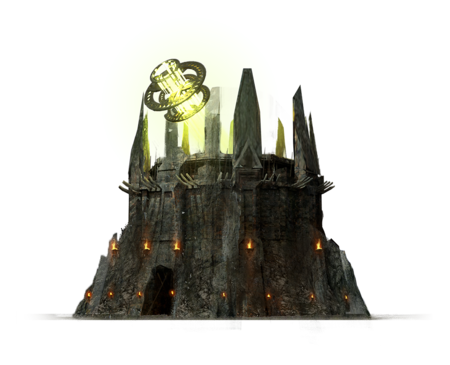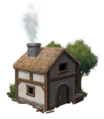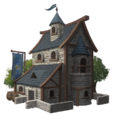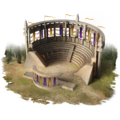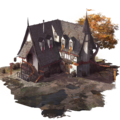Propriété privée
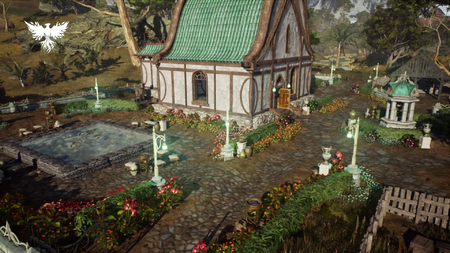
Le but général du système de propriété privée est de donner une utilité à tout, et pas simplement "oh voilà mon bel arrangement", mais c'est un arrangement vers quelque chose pour votre personnage - vers quelque chose pour le monde.[2] – Jeffrey Bard
Une Propriété privée est une Habitation de joueur située sur un terrain ouvert à l'intérieur de la Zone d'influence (ZI) d'un Village (étape 3 de Nœud) ou au-dessus.[4]
- Les propriétés privées sont limitées à une par Compte.[5]
- Les propriétés privées font une taille approximative de 2000m² (ou la moitié d'un acre).[6]
- L'empreinte d'une propriété privée ne change pas en fonction de la Progression de Nœud.[7]
- Des extensions et des améliorations deviennent disponibles lorsque la Progression de Nœud le permet.[6]
- Les propriétés privées ne peuvent pas être vendues à d'autres joueurs.[8]
Le système de Propriété privée interagit avec d'autres systèmes multiples en jeu.[9]
Placement des propriétés privées
Les propriétés privées peuvent être placées n'importe où dans la zone d'influence d'un village (stage 3) d'un nœud (ou plus) tant qu'elles ne sont pas à proximité de l'un des éléments suivants : [11]
- D'un itinéraires de cheminement (Route).[11]
- D'un donjon ou autre points d'intérêt, peu importe l'avancement du nœud.[11][12][13]
- D'une zones de spawn.[11]
- D'une autre parcelle d'une propriété privée déjà occupée.[11]
- D'un élément de terrain large, tels que des flancs de montagne ou des falaises.[14]
Pour placer une propriété privée dans un nœud, il est nécessaire d'obtenir un certificat auprès d'un des dirigeant du nœud.[15]
Plus l'avancement d'un node est important. Plus il sera possible de construire des propriétés au sein de sa zone d'influence.[4]
- Un espace suffisant sera disponible pour placer des propriétés dans la zone d'influence d'un nœud village (stage3).[16]
Un regroupement de propriétés privées placés ensemble est considéré comme faisant partie du nœud et ne deviennent pas un nœud distinct, autrement que via le jeu de rôle.[17]
Baronies
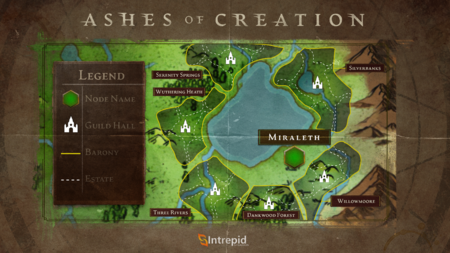
In the region around each node, there are parcels of land that are reserved specifically for the Freehold and Guildhall systems which we call Baronies. A Barony is a predetermined area of land near a node, or in that node’s vassal structure. It can be helpful to think about these Baronies as counties where many Freeholds will be placed. These Baronies may contain a single Guildhall which are similar to Freeholds, but may only be obtained by Guilds. Within each Barony, several Estates exist that may be bid on by individual players. After you’ve successfully bid on an Estate, your Freehold Deed will be available to place within the boundary of the successfully purchased Estate. Once the Deed has been placed, this will start your Freehold, and gives you access to the shed. Bringing materials to your Freehold can be stored in your shed as you prepare to build your home and other buildings.[18]
Baronies are large designated swaths of land in the ZI of a Village (organiser 3) or above node, including the ZOI of any of its vassal nodes.[18][19][20][21][22][23]
- Baronies contain parcels of land, called estates, that are reserved specifically for the freehold and guild hall systems.[18]
- A barony can only have a single guild hall.[18] The number of baronies that can have an active guild hall is determined by the node's stage.[24][25]
- Guild halls are not able to impose any taxes on freeholds within a barony.[26]
- Guild halls owned by partron guilds may have the ability to confer benefits to surrounding estates by speccing into passives in their guild skill tree and carrying out a lengthy quest line.[27]
- Each zone of influence in the world has designated large swaths of land that act as these parcels that can be catered to specific points of interest or thematically relevant; and you might want to bid on that almost county-sized area, where you then get to place your freehold. And once you have bid on that area at the node, then you can acquire the freehold plot and you go out into that zone- that section that you have bid on and acquired, and you place your freehold footprint, which previously we had set the freehold size to about a half an acre; however recently that's changed, well not recently a while ago that changed, to be one and a half acres or roughly 100 by 60.[20] – Steven Sharif
- Players obtain freehold deeds by completing a quest then winning a freehold auction at the parent node. These deeds enable the player to claim a freehold plot in a specific estate.[18][20][21][28][22][23][15][11]
- Imagine the parcel as more like a county that exists around the node; and so if you have a node in the center and you have its zone of influence around it, that's a mass group of land. And then, if you were to take a county line marker and create counties around essentially the node, that is what you would be bidding on. And then once you've achieved the parcel's certificate for that county, then you go out with your... footprint of your freehold, and you get to place the freehold within that county wherever you want- that's not obstructed by some other, road, or POI, or very large feature terrain.[19] – Steven Sharif
- Placement of the freehold plot is enabled by using an unplaced freehold deed item from the player's inventory to get a top-down view of the estate, then selecting the desired location for the plot.[18][29]
- There is a minimum distance between Baronies in addition to the minimum distance between freehold plots.[30]
- Baronies don't impose any appearance restrictions on freehold buildings.[31]
Freehold auctions
A node's freehold estates (parcels of land) become available to be bid for at auction on a regular cadence.[18][32]
- Bidding on an Estate is done through an auction system. Nodes have a limited number of Freehold Deeds available based on that node’s level. A player may only bid on an Estate if they own an unplaced Freehold Deed. Once you have successfully acquired your Estate, the next step is choosing a location within that Estate to lay down your Freehold Deed’s footprint.[18]
- Some estates will require node-type-specific bound currencies, others will auction for gold.[33][34][35]
- This is intended to cater to players with different playstyles, who are progressing through alternate systems.[33][35]
- Node-type-specific currencies will be tested during Alpha-2.[35]
- The most common denominator of availability for freeholds through the auction is going to be through gold. However, there will be a sub select of freehold options that are available in each node, based on the node type, that will correspond to one of those bound currencies in addition to gold. So what we do there is we spread out the availability of freeholds to different playstyles and different focuses so the player that might rush to level 50- they might have an advantage when bidding on gold-based freeholds, but they may not have the advantage of the Favor player or the Honor player, who is going to be progressing within those playstyles.[33] – Steven Sharif
- The cadence of freehold auctions is system-driven and can't be affected by mayors or other players.[36]
- Estates will also be recycled as a result of node sieges and atrophy.[32]
- The intent of the auction system is to provide players a non-land rush type system. Auctions will be held for each parcel that allows families to pool together their resources to acquire a deed, and gives some prep time to individuals to prepare their resources to bid as well.[37] – Steven Sharif
Les avantages d'une propriété privée
La propriété privée offre les bénéfices suivants.
- Les propriétés privées permettent aux propriétaires de vendre des consommables qui ne peuvent être achetés que dans des bâtiments spécifiques.[38]
Bâtiments de propriété privée
Différents bâtiments peuvent être placés sur une le terrain d'une propriété privée.[4][40]
- Artisan buildings
- Business buildings
- Fishery
- Freehold building blueprints
- Freehold building permits
- Freehold building tech trees
- Freehold farms
- Guild hall skins
- Salles de guilde
- Fermes
- Auberges
- Large homesteads
- Cour à bois
- Medium homesteads
- Metalworking stations
- Mills
- Patron guild halls
- Sheds
- Shrines
- Small homesteads
- Smithies
- Stables
- Tavernes
Chaque bâtiment nécessitera des plans et différents matériaux.[15]
- Les sous-sols dans les bâtiments en propriété privée sont encore à décider.[41]
La taille des bâtiments en propriété privée ne changera pas en matière de largeur, mais pourrais augmenter en terme de hauteur.[7]
- Certains bâtiments auront plusieurs variantes, avec différentes tailles. (Par exemple : une maison de taille petite, moyenne, grande, jusqu'à un manoir.)[7]
- Une maison de la taille d'un manoir pourrais occuper jusqu'à 50% du terrain d'une propriété privée.[7]
L'Architecture d'un bâtiment en propriété privée est basé sur le plan de construction du bâtiment.[42]
- Les cosmétiques peuvent également être appliqués à un plan selon le type du bâtiment.[42]
- La race choisie par le joueur n'influence pas les plans de construction qu'il peut obtenir. (chaque races peut obtenir tous les plans de construction sans restriction particulière) .[43]
Nous voyons les propriétés privées comme votre espace personnel, nous voulons donc que vous puissiez lui donner l'apparence que vous souhaitez.[42] – Jeffrey Bard
Placement d'un bâtiment sur une propriété privée
Les joueurs auront accès à un système basé sur une grille qu'ils pourront utiliser dans leur propriété privée pour placer des objets/accessoires et des bâtiments sur leur terrain.[44][6]
- Les joueurs devront gérer la façon dont les bâtiments sont organisés pour maximiser les primes de proximité.[6]
Selon l'endroit où est placé votre propriété privée, vous aurez différentes grilles environnementales à votre disposition et celles-ci activeront ou amélioreront en quelque sorte les structures existantes que vous placez dans votre propriété privée... Je ne sais pas si nous mettrons "la pisciculture" seulement pour une propriété privée qui est placée sur une rivière. Ce que nous ferions probablement par exemple, c'est de vous donner un bonus à la pêche dans cette zone. Ou un truc du genre. Il y aura donc plus de bonus pour les grilles environnementales plutôt que pour les bâtiments spéciaux présents dans cette zone. Mais encore une fois, nous ne sommes pas encore complètement intégrés à ce système, mais il est possible que nous finissions par aller dans cette direction.[45] – Jeffrey Bard
Naming buildings
Bâtiments will be able to be named. The custom name will appear as floating text when it is targeted.[46]
Freehold building skins
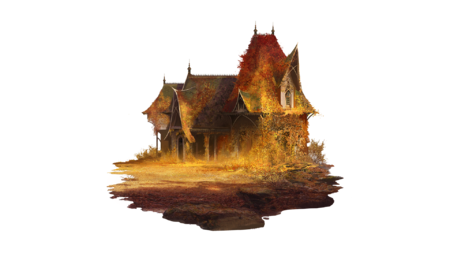
After you build your house, you can build other buildings on your Freehold. Each building needs the blueprint to start the process. If you have a cosmetic skin you want to use on a building, this is used after placing the blueprint. Once this has been placed, the building will be shown in a non-functional, construction state. Players will need to provide the required materials needed to complete the building construction, for each building on their Freehold.[18]
Freehold building skins were offered as Kickstarter and Summer crowdfunding rewards and were available in pre-order packs.[48][49][50][51][52]
- Freehold building skins can also be achieved in-game.[53]
- Freehold skins can be applied to blueprints matching the type of freehold building: housing, artisanship, and business.[18][53][22][48][55][42][56]
- Cosmetics that we have sold as part of different packs throughout the past- our pre-order system: Those cosmetics are split into three primary categories: housing, artisanship, and business; and we will have a breakdown that we're going to be releasing of the cosmetics that have come previously and which categories they exist in, but players will have the option to override the appearance of a blueprint that exists within one of those categories with an associated cosmetic skin; and that is obviously not just something that can be purchased through the pre-order system, but also can be achieved in-game as well- our cosmetics that can be applied to specific building types. And we don't get as granular where, let's say, you might have a shrine cosmetic, and you have, let's say, a blacksmith building that you wouldn't be able to apply the shrine to the blacksmith building. If the shrine exists in the artisanship lane you can apply it to any artisanship type building, but not to a house or business. so giving a little bit of additional context there.[53] – Steven Sharif
- The vast majority of cosmetic freehold skins apply to homestead buildings.[59]
- A planned feature may allow multiple buildings to be replaced by a single large cosmetic skin.[60]
- Cosmetics that are are very large in size- we will have a system that's not been developed yet, but we've been planning for this: we'll have a system where multiple buildings can be occupied space-wise by the larger cosmetic. So, a cosmetic might replace the visual appearance of one particular building, but then you'll be able to have that footprint occupy multiple buildings to replace the visual appearance. So that way you're still utilizing the similar amount of space.[53] – Steven Sharif
- Baronies won't impose any appearance restrictions on freehold buildings.[31]
List of freehold building skins
Freehold professions
- Artisan buildings on freeholds enable placement of processing and crafting stations.[59][61]
- Business buildings on freeholds allow freehold owners to provide services to other players.[22]
Processing stations
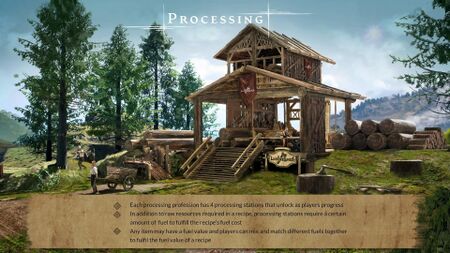
Processing stations are of course a necessary component of taking gatherables into usable crafted goods essentially to fulfill what recipes require in order to make items.[59] – Steven Sharif
We're trying to marry the visuals with what's actually going on with the station. So, if you have a job queued and you're trying to do errands throughout the node, or in your freehold or whatever, [you] should be able to look at the station and know what's going on with it: So you know he's there working and once he's done he's going to stop and you can be like, okay there's stuff ready to pick up and have some visuals associated with that. So, as much as we can have stuff rooted in world instead of throwing a bunch of UI in the player's face, that's something that we're trying to do and is important to us.[63] – Kory Rice
Processing stations are workstations that are used to process raw materials into processed goods (crafting materials) at nodes or on freeholds.[18][64][59][61][65]
- Artisan buildings are required to be placed on freehold (and node) plots to unlock placement of processing stations.[18][22][66]
- Each processing profession has four processing stations that unlock as players progress through their artisan building tech trees.[67][68][22]
- Each processing profession will have four stations; and the stations will come online as you progress through the profession. Each one of those stations will make goods that are immediately useful to the economy, to crafters, to other processors; and each processing station will build on itself and into the other stations.[69] – Kory Rice
- Master and grandmaster processing can only take place on freeholds.[22][70]
- Processing as it stands for Alpha-2's implementation is that there is a certain amount of prep work that's required first for the industry-specific component, which is the building. That prep work might be finding a certain amount of lumber to light the fire in kiln or whatever, to a certain temperature in order for you to process a certain grade of ore; and that grade of ore being malleable then into an ingot; and that produces that ingot so-to-speak. Now, in that process there's a gathering component, there's a preparatory phase, there is a time-related component.[72] – Steven Sharif
- Processing stations have queue slots that allow jobs to be queued at that station.[73] Processing jobs are processed sequentially for all players in freeholds. Processing jobs in nodes are processed sequentially per player, but concurrently with other player's jobs.[74]
- Q: Can you provide more details in regards to the design philosophy behind why it's a queue system for freeholds but not for nodes?
- A: On the freehold, processing can achieve the highest levels of processing. That's where the highest levels of processing occur. Nodes can only go up to a certain level of processing. Now we want to be able to throttle the amount of resources that can be processed at any given time in response to the fluctuation and flows of the economy. So, we want to make sure that the economy is a bigger ship when turning than being able to immediately start processing everything at once and get new resources out as the flow of supply and demand changes within the world. And because- again that's at the highest levels of processing; and you're sharing the available queues that exist at those stations. It's going to take time and it's going to take a long time for the higher level materials.[75] – Steven Sharif
- There will also be time-related and gameplay elements that require the player to interact with processing stations.[73] These elements act to throttle the introduction of processed materials from raw gatherables into the economy.[72]
- There's also possibilities that the machine you're using itself has some type of gameplay layer- should the kiln get overheated, and you have to throw some water on it or something. There are elements there in that process that we want to mimic this gameplay opportunity for players to interact; and not just be a time-sink. But time-sink is also a component of it as well, because that's the throttle for the introduction of processed materials from raw gatherables into the economy.[72] – Steven Sharif
- Processing times, yields, queue times, and job sizes can increase based on node progression, service building upgrades, node policies, and relics.[76][73][65]
- That's going to be very important as you get to very late game processed materials that are required. Because some of these things might have days to process within a station, but if you have spent the time and done the work to advance that processing station you could cut that down considerably, perhaps even greater than 50 percent; and that's going to have a significant impact on your ability to either control markets or to create goods.[65] – Steven Sharif
- Processing stations are distinct from crafting workstations that are used to craft finished goods.[70][64]
- The developers are considering a decay system for processing stations similar to item decay for gear.[77]
- Q: Do processing stations wear out over time? Do they have to be repaired?
- A: That's something that we're still discussing internally. It is coded in such a way where it's an easy variable for us to change that. There are material components that are necessary to feed the machines to keep them up and running, or it could be based on how you interact with the fuel components. If you overheat- overcharge with fuel, that can create like a system degrade similar to your armor decay, which then you have to feed materials in order to rebuild maintenance-wise. Right now it is not implemented. With that in mind, the only maintenance required is going to be through taxation. And depending on the number of permits that you have placed on the freehold will increase the amount of taxes that are necessary to be paid for the freehold.[77] – Steven Sharif
Freehold progression
Freehold progression unlocks new bonuses, abilities and capabilities for freeholds.[78]
- Bâtiments de propriété privée are able to be levelled up based on the length of time and productivity of the freehold.[78]
- We want there to be progression in many systems and part of the freehold progression is that when you establish these base buildings the longer and more productive you are and exist with that freehold, the more opportunity those buildings will have to both level up: offering new bonuses, new abilities, new capabilities; and just surviving in this world is a feat in and of itself, so it's rewarded by allowing progression with those things.[78] – Steven Sharif
Business chains
There's no reason why you couldn't license your name to somebody else who also has a freehold and who also has an Inn and work together.[79] – Jeffrey Bard
Tavernes
The longer a tavern is in business and the more patrons served, the faster the tavern will level up.[80][81]
- Q: What benefits do players receive for taking on the role of a tavern owner?
- A: You will get noticeability with regards to your creations because that will be displayed to the characters that consume those things; but, in addition, you can get certain types of itemization rewards depending on the number of patrons that you serve. You can also reap economic rewards, such as gold from the inn that you are selling your goods at. And then you can unlock access to certain types of recipes and or vendors based on the level of reputation you build up in that particular node.[80] – Steven Sharif
- Taverns have tech trees that allow the tavern owner to specialize and upgrade specific bonuses and services provided by the business.[82][81]
Freehold farms
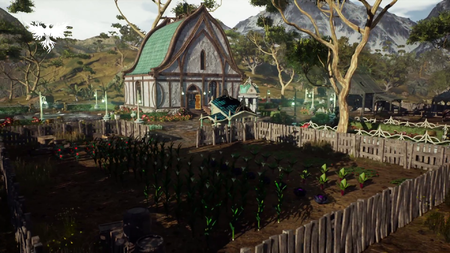
Crops are intended in Ashes to be a rotational profession that is dependent on having the appropriate seedlings and/or any of the necessary tools.[83] – Steven Sharif
Freehold farms are workstation plots available for farming crops and livestock on freeholds.[84][84][85][86][6][87][88]
- Collecte and processing professions such as hunting, taming, and animal husbandry can benefit from having room for animals on a freehold.[18]
- Freehold permissions can be granted to allow other players to harvest resources on a freehold farm.[18]
- If farming and raising animals is important to you, then know that having room for this on your Freehold is a balancing act. Since Freeholds have space constraints, players will need to make choices about how much room they want to set aside for buildings, and where they want to do things like crop placement and rotation, and where to put livestock animals.[18]
- Artisan freehold features are also affected by adjacent terrain features. For example: building next to a river provides a nearby source of clean freshwater, and will have a positive effect on crops.[90]
Fisheries
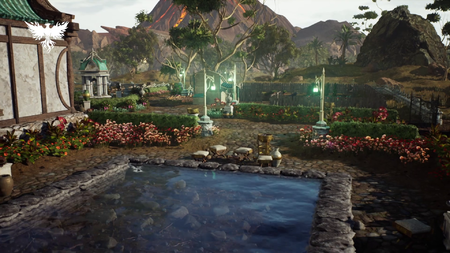
You actually see there a small pond, which is actually another type of farmable area that we're going to have available on the freehold system, which is essentially a fishery so to speak. So fish play an important role from a raw gatherables a standpoint, but also again because a lot of the components of the freehold system are intended to be processing of raw materials, the fishery allows for a focus on specific type of fish gatherables that may only be gathered through the fishery blueprint.[83] – Steven Sharif
A fishery is a farmable workstation that can be placed on a freehold plot. A fishery allows gathering of fish that are unique to the fishery blueprint.[83]
La sécurité des propriétés privées
La sécurité du ménage permettra à un propriétaire d'accorder l'accès à des parties spécifiques de son logement.[91][92][93]
- Possibilité d'ouvrir la porte et d'entrer dans la maison.[94][92][93]
- Accès à crops.[92]
- Possibilité de déposer ou de retirer des articles du storage.[95][94][92][96][97]
- Autorisation d'utiliser les furniture ou la crafting stations.[94]
Une propriété a un seul propriétaire.[91]
- Le marriage permet de créer une famille et permet à ce que l'accès au logement puisse être partagé.[98]
- Les listes d'accès peuvent être utilisées pour imiter la copropriété.[93]
- Le paiement des taxes peut être fait via un "accord de gentleman".[99]
- Les maires sont en mesure d'allouer des ressources pour recruter des PNJ's mercenaires pour défendre leur noeud pendant les sièges.[100]
Ce sera un système basé sur un seul propriétaire pour ces types de propriétés - pour les propriétés en général, cela n'empêche évidemment pas les joueurs que vous connaissez de collaborer et de partager les ressources afin de réaliser certains exploits dans le jeu.[91] – Steven Sharif
Les joueurs ne peuvent pas voler d'une propriété privée dans des circonstances normales.[101]
- Les objets stockés dans une propriété privée peuvent devenir pillables après une réussite d'un siège de noeud.
Les joueurs ne peuvent pas JcJ à l'intérieur d'une propriété privée (sauf suite au succès d'un siège de noeud).[102][103][104]
- Un duel peut être lancé dans une propriété privée ou dans un noeud car ils sont considérés comme des événements indépendants, et ne relèvent pas du système marquage de joueur (Player Killer).[105]
- La propriété privée est destinée à être une zone protégée à moins qu'il n'y ait un siège et que la ville ne soit détruite. Si la ville est détruite, la propriété privée est à gagner et devient donc une zone PvP.[103] – Steven Sharif
- Les gardes PNJ's qui protège et reste en permanence sur la propriété privée ne sont pas une fonctionnalité prévue.[104]
- Des mercenaires PNJ's peuvent être missionnés pour défendre les propriétés privées suite à un siège de noeud réussi.[106]
- Q: Nous parlions plus tôt dans le chat à propos des propriétés privées et si une personne serait ou non en sécurité dans sa maison ou dans l'intégralité de sa propriété privée contre les players killers (PK)??
- A: Je pense que nos tests initiaux vont tourner autour de "l'empreinte" de leur propriété privée, puis nous prendrons en considération les mesures nécessaires à partir de ces tests.[102] – Steven Sharif
L'autorisation de décorer une propriété privée est réservée au propriétaire de la propriété privée.[94]
- Auparavant, il était indiqué que l'autorisation de décorer une habitation pouvait être accordée à un autre joueur que le propriétaire. Mais il était interdit pour le joueur ayant obtenu cette autorisation de pouvoir retirer les décorations pour s'attribuer cette dernière.[92]
Destruction de Propriété Privée
Une Propriété privée peut être attaquée pendant une période de temps de deux heures[107] à la suite d'un siège de nœud réussi contre son Nœud parent.[106]
- Les joueurs et leurs alliés peuvent défendre leurs propriétés privées pendant cette période de temps.
- Des structures et des Gardes peuvent être obtenus pour défendre les propriétés privées pendant cette période de temps.
Après la période de temps de deux heures de combat ouvert à la suite d'un siège de nœud réussi, toutes les propriétés privées restant existeront sous une période de protection pendant environ 1 semaine pendant laquelle un autre Nœud peut prendre le contrôle de la Zone d'influence de la propriété privée.[107]
- Si la propriété ne réside pas à l'intérieur d'une zone d'influence d'un nœud de niveau 3(Village) ou au-dessus, elle sera détruite.[108]
Si un siège est réussi, le nœud est réduit au niveau 0, et tous ceux qui étaient des citoyens de ce nœud ne le sont plus. Les propriétés privées à l'intérieur de la zone d'influence sont sujet à une période de vulnérabilité. Ces propriétés privées peuvent être détruites par d'autres joueurs pendant une période d'environ 2 heures après un siège réussi. Les propriétés privées détruites sont sujettes à la perte de matériaux, et leurs plans sont envoyés par la poste au joueur pour un futur placement, de façon à permettre au joueur de garder son agencement et la structure de la propriété. Une fois la période de vulnérabilité terminée, toutes les propriétés privées restantes existeront sous une période de protection pendant environ 1 semaine où un autre nœud peut prendre le contrôle de la zone d'influence dans laquelle se trouve la propriété.[107] – Margaret Krohn
Housing designs
L'agencement d'une habitation de joueur et ses décorations d'habitation sont conservés et peuvent être replacés plus tard si l'habitation a été détruite dans un siège de nœud.[109][110]
- Les plans sont envoyés par la poste aux joueurs pour être utilisés pour un placement futur.[107]
- Une propriété privée détruite est sujette à la perte de matériaux.[107]
- Les certificats traqueront les étapes majeures (comme les forges ou les fermes, par exemple).[109][110]
- Une idée possible de design serait que les objets tels que les meubles soient emballés dans des caisses qui sont accessible dans la nouvelle maison.[111]
Guild freeholds
Lorsqu'une guilde atteint un certain niveau, son maître de guilde reçoit un certificat de freehold de guilde permettant de placer un hall de guilde.[112]
Underrealm freeholds
Ressources will be different in the Underrealm, including unique species of fish.[113][114][115]
- This will affect professions such as fishing, farming, and animal husbandry.[113][115]
- Since players may only have one Freehold, they must choose their Artisan specializations accordingly if they wish to place it in the Underrealm.[115]
Housing types
| Habitation de joueur | Type. | Disponibilité. | Limite. |
|---|---|---|---|
| Appartements | Instancié.[4] | Etape Village ou plus haut.[116] | Une par serveur.[5] |
| Propriété privée | Monde ouvert.[4] | Etape Village ou plus haut.[4] | Une par compte.[5] |
| Maison statique | Dans un Nœud.[4] | Etape Village ou plus haut.[4] | Une par serveur.[5] |
Immobilier
Les joueurs achètent les actes d'Habitation de joueur depuis le Nœud lui-même.[117] Les joueurs peuvent également acheter et vendre des propriétés aux autres joueurs.[4]
- Les habitations auront un prix de base qui évoluera avec le nombre de citoyens à l'intérieur du Nœud.[118]
- Une Habitation de nœud coûtera très cher, et sera très contestée.[4]
- Plus le nombre d'Appartements est élevé dans un Nœud, plus le prix évoluera.[119]
- Les développeurs étudient une méthode de vente aux enchères pour les nouvelles propriétés qui deviennent disponible à l'achat lors de l'Avancement de Nœud.[120]
- Un période de grâce sera mise en place avant qu'une habitation devienne disponible pour la vente aux enchères.[120]
- Des enchères seront ensuite acceptées commençant par la valeur minimale basée sur le nombre de citoyens dans ce nœud.[120]
- A la fin de l'enchère, l'enchère la plus élevée remportera la maison.[120]
- Une Habitation statique et des Appartements peuvent être listés et vendus aux autres joueurs.[8][121]
- Il n'y a pas de limite sur les prix de la vente d'une maison organisée par les joueurs.[122]
- Une Habitation de joueur détruite durant un siège de nœud ne peut plus être vendue.[123]
- Une Propriété privée ne peut pas être vendue aux autres joueurs.[8] Sujet à des changements suite aux tests.[124]
Il n'y a pas de limite sur les prix d'une vente organisée par les joueurs. Ils seront déterminés essentiellement par l'offre et la demande à l'intérieur du jeu et il n'existe pas de barrière artificielle jusqu'où la demande peut augmenter.[122] – Steven Sharif
- La propriété d'une maison peut retourner au Nœud si le propriétaire échoue à payer ses taxes foncières. Une balance et des pénalités seront chargées au nouvel acheteur de la maison à la manière d'un "processus de saisie".[118]
- Les joueurs ne pourront pas excéder leur allocation d'habitation dans le jeu.[125]
Cela permettra aux joueurs de transférer des biens immobiliers. Cela inclut ... des maisons statiques, des appartements qu'ils possèderaient ; et ils peuvent vendre ceux-ci car ils auront une quantité limitée et finie.[125] – Steven Sharif
Le concepts de location et de prêt sont considérés à ce jour.[125]
Certains concepts que nous avons sont par exemple la location ou le prêt qui pourraient éventuellement permettre aux joueurs de louer une propriété pour une période de temps où les droits de contrôles sur l'utilisation des emplacement de stockage de la zone, contrôler les meubles ou les points d'accès ; ce genre de choses.[125] – Steven Sharif
Housing taxes
Lorsqu'un noeud atteint l'étape 3 (village) et qu'un gouvernement dirigé par les joueurs s'est formé, toutes les habitations de joueurs paieront des impôts.[126]
- Le montant des impôts d'un joueur sera déterminée par le nombre de structures construites sur son terrain.[127]
Housing foreclosures
Housing foreclosures result from failing to pay property taxes or other fees.[128][18]
- Non-payment of taxes will put the housing into a default status. The player will have a period of time to settle the debt before the housing is foreclosed.[128]
- The developers are considering allowing pre-payment of housing taxes and/or allowing auto deduction of tax from a designated location, such as their personal inventory or warehouse.[129]
- Matériaux and resources (such as livestock) that were stored on foreclosed freeholds will be included in the auction for the deed to that freehold. Stored and placed props, such as furniture will be returned to the previous owner.[18]
- If you don’t pay taxes and other fines, your Freehold property will be foreclosed. When a Freehold is foreclosed on, stored and placed props like furniture are returned to the previous owner. Materials that were stored on a Freehold will be included in the auction for the Deed to that Freehold.[18]
- Non-payment of the game subscription will also result in loss of player housing.[130]
Visuels
2023-07-10 2023-07-08 2023-07-02 2023-07-01 2023-07-01 2023-07-01 2023-07-01 2023-07-01 2023-07-01 2021-04-15 2021-04-04 2020-05-30 2018-01-19
Voir également
Les références
- ↑ Direct, 2020-05-29 (36:29).
- ↑ Direct, 2020-05-29 (42:01).
- ↑ 3.0 3.1 3.2 Direct, 2020-05-29 (35:36).
- ↑ 4.0 4.1 4.2 4.3 4.4 4.5 4.6 4.7 4.8 4.9 Node series part II – the Metropolis.
- ↑ 5.0 5.1 5.2 5.3 Entrevue, 2018-05-11 (50:47).
- ↑ 6.0 6.1 6.2 6.3 6.4 Direct, 2017-10-16 (56:42).
- ↑ 7.0 7.1 7.2 7.3 Entrevue, 2020-07-08 (45:23).
- ↑ 8.0 8.1 8.2 Direct, 2020-06-26 (47:32).
- ↑ 9.0 9.1 9.2 9.3 9.4 9.5 Direct, 2017-10-16 (56:38).
- ↑ Vidéo, 2017-05-25 (0:02).
- ↑ 11.0 11.1 11.2 11.3 11.4 11.5 Direct, 2017-05-19 (32:23).
- ↑ Direct, 2020-06-26 (1:52:33).
- ↑ Direct, 2018-05-09 (40:24).
- ↑

- ↑ 15.0 15.1 15.2

- ↑

- ↑ Direct, 2017-05-26 (34:21).
- ↑ 18.00 18.01 18.02 18.03 18.04 18.05 18.06 18.07 18.08 18.09 18.10 18.11 18.12 18.13 18.14 18.15 18.16 18.17 18.18 18.19 Blog: Exploring the Boundless Opportunities of Freeholds.
- ↑ 19.0 19.1 Entrevue, 2023-07-09 (29:53).
- ↑ 20.0 20.1 20.2 Direct, 2023-06-30 (1:12:07).
- ↑ 21.0 21.1 Direct, 2023-06-30 (14:09).
- ↑ 22.0 22.1 22.2 22.3 22.4 22.5 22.6 22.7 22.8 22.9 Development Update with Freehold Preview.
- ↑ 23.0 23.1 Vidéo, 2023-06-30 (21:22).
- ↑ Podcast, 2023-07-15 (6:25).
- ↑

- ↑

- ↑

- ↑ Direct, 2023-06-30 (13:10).
- ↑ Direct, 2023-06-30 (16:14).
- ↑ Entrevue, 2023-07-09 (32:53).
- ↑ 31.0 31.1 Entrevue, 2023-07-09 (31:18).
- ↑ 32.0 32.1 Direct, 2023-06-30 (1:13:53).
- ↑ 33.0 33.1 33.2 Podcast, 2023-07-15 (15:14).
- ↑

- ↑ 35.0 35.1 35.2 Entrevue, 2023-07-09 (19:56).
- ↑ Entrevue, 2023-07-09 (22:32).
- ↑

- ↑
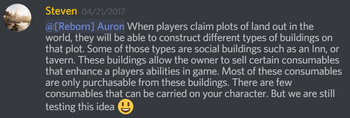
- ↑ Ashes of Creation Store: Velkor's Eye.
- ↑ Direct, 2017-05-24 (9:58).
- ↑ Direct, 2019-06-28 (1:09:22).
- ↑ 42.0 42.1 42.2 42.3 42.4 Direct, 2020-08-28 (2:14:06).
- ↑ Direct, 2017-05-26 (44:11).
- ↑ Direct, 2020-05-29 (41:27).
- ↑ Direct, 2018-12-06 (44:14).
- ↑ Direct, 2018-10-31 (46:18).
- ↑ Ashes of Creation Store: Sunbeam's Remembrance.
- ↑ 48.0 48.1 48.2 Direct, 2023-06-30 (22:05).
- ↑
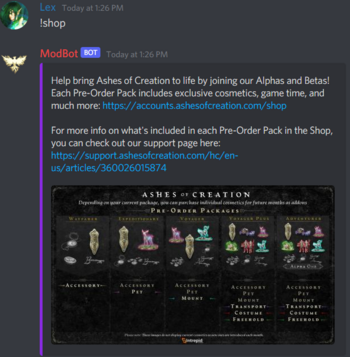
- ↑ What is included with my Pre-Order package?
- ↑

- ↑
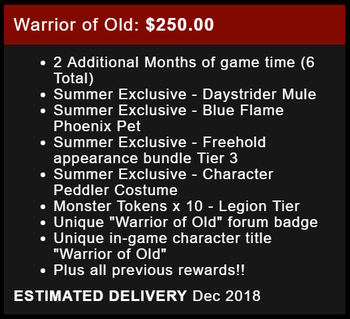
- ↑ 53.0 53.1 53.2 53.3 Direct, 2023-06-30 (23:40).
- ↑

- ↑ 55.0 55.1 Direct, 2020-11-30 (57:50).
- ↑ 56.0 56.1

- ↑ 57.0 57.1 Direct, 2023-06-30 (1:15:34).
- ↑

- ↑ 59.0 59.1 59.2 59.3 Direct, 2023-04-07 (31:49).
- ↑ Direct, 2023-06-30 (1:21:07).
- ↑ 61.0 61.1 Direct, 2022-06-30 (1:08:02).
- ↑ Vidéo, 2023-11-30 (46:59).
- ↑ 63.0 63.1 Vidéo, 2023-11-30 (48:22).
- ↑ 64.0 64.1

- ↑ 65.0 65.1 65.2 Podcast, 2021-04-11 (40:20).
- ↑ Vidéo, 2023-06-30 (15:34).
- ↑ Entrevue, 2023-07-09 (33:55).
- ↑ Direct, 2023-06-30 (33:26).
- ↑ Direct, 2023-06-30 (37:30).
- ↑ 70.0 70.1 70.2 Vidéo, 2023-06-30 (16:02).
- ↑ 71.0 71.1 Direct, 2023-06-30 (38:18).
- ↑ 72.0 72.1 72.2 72.3 Direct, 2022-02-25 (1:12:27).
- ↑ 73.0 73.1 73.2 Direct, 2023-11-30 (1:26:16).
- ↑ Vidéo, 2023-11-30 (39:15).
- ↑ Direct, 2023-11-30 (1:28:10).
- ↑ Vidéo, 2023-11-30 (43:43).
- ↑ 77.0 77.1 Entrevue, 2023-07-09 (54:46).
- ↑ 78.0 78.1 78.2 Podcast, 2018-05-11 (48:29).
- ↑ Direct, 2017-05-26 (50:00).
- ↑ 80.0 80.1 Direct, 2022-12-02 (1:22:30).
- ↑ 81.0 81.1 81.2 Podcast, 2018-04-23 (29:56).
- ↑ Direct, 2023-06-30 (27:52).
- ↑ 83.0 83.1 83.2 Direct, 2020-05-29 (39:47).
- ↑ 84.0 84.1 Vidéo, 2023-06-30 (6:39).
- ↑ Entrevue, 2021-02-07 (42:41).
- ↑ Direct, 2020-10-30 (44:22).
- ↑ Direct, 2017-05-30 (20:01).
- ↑ Direct, 2017-05-05 (32:11).
- ↑

- ↑ Direct, 2017-05-05 (15:47).
- ↑ 91.0 91.1 91.2 Direct, 2020-06-26 (58:32).
- ↑ 92.0 92.1 92.2 92.3 92.4 Direct, 2020-06-26 (51:58).
- ↑ 93.0 93.1 93.2 Direct, 2017-05-19 (26:40).
- ↑ 94.0 94.1 94.2 94.3 Direct, 2021-04-30 (1:12:33).
- ↑ Direct, 2021-07-30 (1:14:33).
- ↑ Direct, 2019-06-28 (1:23:31).
- ↑

- ↑ Direct, 2021-01-29 (1:13:04).
- ↑ Direct, 2018-02-09 (51:57).
- ↑ Direct, 2020-06-26 (59:11).
- ↑ Direct, 2017-05-17 (1:03:23).
- ↑ 102.0 102.1 Entrevue, 2018-08-08 (6:44).
- ↑ 103.0 103.1 Direct, 2021-11-19 (54:26).
- ↑ 104.0 104.1 Direct, 2018-01-18 (31:05).
- ↑ Direct, 2021-12-23 (1:29:27).
- ↑ 106.0 106.1 Direct, 2017-05-19 (28:04).
- ↑ 107.0 107.1 107.2 107.3 107.4 Blog - Know Your Nodes - Advance and Destroy.
- ↑ Direct, 2017-05-19 (29:34).
- ↑ 109.0 109.1 Direct, 2017-07-18 (40:14).
- ↑ 110.0 110.1 Direct, 2017-11-17 (47:10).
- ↑ Direct, 2020-06-26 (1:00:57).
- ↑ Entrevue, 2019-04-21 (45:45).
- ↑ 113.0 113.1 Direct, 2023-04-07 (27:30).
- ↑ Transcription, 2022-11-05 (10:46:47).
- ↑ 115.0 115.1 115.2 Direct, 2017-06-01 (24:30).
- ↑ Steven Sharif - Clarification points from today’s stream.
- ↑ MMOGames interview, January 2017
- ↑ 118.0 118.1 Direct, 2020-06-26 (53:41).
- ↑ Direct, 2017-05-12 (52:01).
- ↑ 120.0 120.1 120.2 120.3 Direct, 2017-05-12 (55:01).
- ↑ Direct, 2020-06-26 (54:03).
- ↑ 122.0 122.1 Entrevue, 2020-07-08 (33:34).
- ↑ Direct, 2020-06-26 (1:02:12).
- ↑ Direct, 2020-06-26 (56:08).
- ↑ 125.0 125.1 125.2 125.3 Direct, 2019-05-30 (1:23:41).
- ↑

- ↑

- ↑ 128.0 128.1 Direct, 2023-08-31 (24:13).
- ↑ Direct, 2023-07-28 (1:29:07).
- ↑ Direct, 2017-05-24 (42:22).
